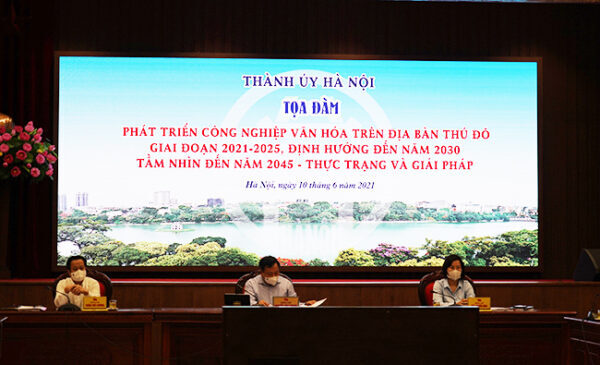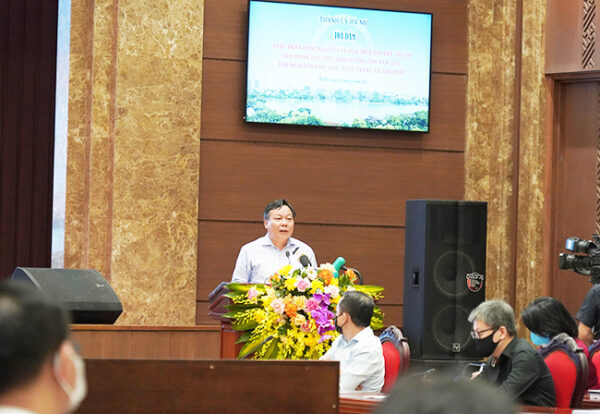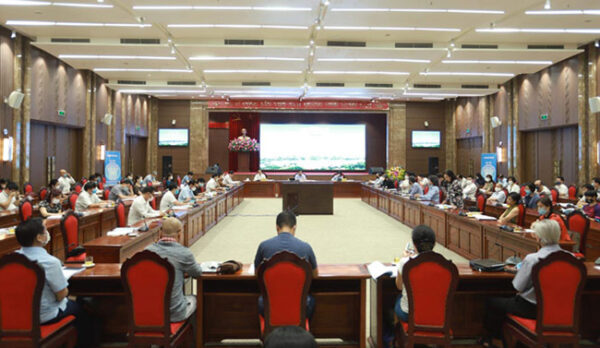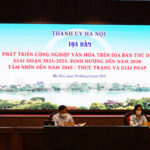
The Deputy Secretary of the Hanoi Party Committee, Mr. Nguyen Van Phong chaired the morning session of June 10, 2021
Attending the seminar was: the Member of the Standing Committee of the City Party Committee, Head of the Communication Department of the City Party Committee, Ms. Bui Huyen Mai; and Party Committee’s Member, Director of Department of Culture and Sports, Mr. Tran The Cuong.
According to the 2007 UNESCO Convention, Cultural industries are industries that produce tangible and intangible products of art and creativity, which have the potential to promote the creation of wealth and income through the exploitation of cultural values and the production of knowledge-based products and services. Currently, for many countries around the world, the “cultural industry” has become a spearhead economic sector, having a great influence on socio-economic development, security and defense, international exchanges and integration and contributed to the goal of culturally sustainable development.
For Vietnam, Resolution No. 33-NQ/TW by the 11th Party Central Committee on “Building and developing Vietnamese culture and people to meet the country’s requirements for sustainable development” identified: Development of Cultural industry is one of the goals in the new period, aiming to “exploit and promote the unique potentials and values of Vietnamese culture; encouraging the export of cultural products, contributing to the promotion of Vietnamese culture to the world”. The Resolution by the 13th Party Congress also affirmed: “Expeditiously deploy the focused development of the cultural industry and cultural services on the basis of identifying and promoting the soft power of Vietnam culture, effectively applying new values and achievements of the world’s culture, science, technology and technology”.
As the capital, the political and administrative center of the country, a major center of culture, science, education, economy and international transactions of countries, Hanoi always identifies culture as the center of development policy, culture is not only a goal and motivation but also an endogenous strength and an important resource for the development of the Capital in the context of international integration and globalization. Especially when Hanoi has become the first city of the country and one of the first 3 capitals of Southeast Asia to be included in the UNESCO Creative Cities Network in 2019.
Speaking at the seminar, the Head of the Communication and Education Department of Hanoi Party Committee, Ms. Bui Huyen Mai said that the City Party Committee decided to choose to develop the Resolution with the theme of “Developing the cultural industry in the Capital area in the period 2021 – 2025, orientation to 2030, vision to 2045” (one of the two thematic resolutions determined during the whole term of the Congress) as a breakthrough in the cultural development of the Capital with an open vision, to keep pace with the trend of the times; constantly develop, improve the quality of culture, ensure the harmony between cultural preservation and development, improve the people’s spiritual life in association with narrowing the gap, improving the ability to enjoy culture between different countries. regions (urban areas, suburbs, areas far from the center…), making an important contribution to promoting economic growth, increasing the proportion of contributions to the City’s GRDP; towards the goal of each period, striving to 2045, Hanoi “has a high quality of life; comprehensive and sustainable economic, cultural and social development; is a globally connected city with international competitiveness, GRDP/person is over USD 36,000”.
This is both the concretization of the task set out in the “Strategy for development of Vietnam’s cultural industries to 2020, with a vision to 2030” of the Government, Program No. 06 – CTr/TU of the Hanoi City Party Committee (17th course) on “Developing culture, improving the quality of human resources, building elegant and civilized Hanoians, period 2021 – 2025”, is also the high political determination of the City to implement the commitment to UNESCO in building Hanoi into a “Creative City” in the field of “Design” of Southeast Asia, with the foundation of creative cultural industries.

Deputy Secretary of the Hanoi Party Committee, Mr. Nguyen Van Phong delivered a speech concluding the first seminar on the morning of June 10, 2021
On April 9, 2021, the City Party Committee issued Plan No. 22-KH/TU on the implementation of thematic resolution on “Developing the cultural industry in the Capital area in the period 2021 – 2025, orientation to 2030, vision to 2045”. In order to ensure the scientific and practical feasibility of this thematic Resolution, the Hanoi Party Committee has carried out the development of the project “ Developing the cultural industry in the Capital area in the period 2021 – 2025, orientation to 2030, vision to 2045”, including surveying and assessing the current situation, advantages and disadvantages of the City, and consulting initiatives by experts.
Within the framework of the requirements and tasks set out, the Hanoi Party Committee and People’s Committee organized 3 seminars on the topic of “ Developing the cultural industry in the Capital area in the period 2021 – 2025, orientation to 2030, vision to 2045- Current situation and solutions” with the desire to receive contributions and consultations from experts, scientists, managers, businesses, and active creative communities in the field of culture and art over 12 areas identified in the Government’s Strategy for the Development of Cultural Industries such as: Cinema; Performing Arts; Advertisement; Crafts; Software and entertainment games; Television and radio; Fashion; Cultural tourism; Architecture; Design; Publish; Fine Arts, Photography and Exhibitions.
Discussions will focus on four topics: Firstly, identifying potentials and strengths of Hanoi in the fields of cultural industry. Assessing the economic resources that cultural industries can contribute to the Capital’s GRDP growth. Secondly, the fields of enterprises, organizations and individuals operating in the field of culture and art are of interest, advantages and disadvantages in the current development process. Thirdly, making consultative and suggestive initiatives; proposal of mechanisms and policies to the City authority which facilitate the development of cultural industries. Fourthly, the participation and contribution in the City’s implementation of the Resolution.
At the first talk show on the morning of June 10, 2021, there were 12 opinions from journalists, producers, writers and artists in many fields such as music, fine arts, cinema, etc. performing arts. Most of the comments pointed out the potentials, advantages as well as difficulties and limitations, and made practical contributions to the development of the Capital’s cultural industry in the coming period.
According to journalist Phung Cong Suong, cultural industry is a new field for Vietnam, so it needs to be widely advertised and propagated so that people can raise awareness about the role of culture in the overall development strategy. The Chairman of Creative Entrepreneurs Club, Chairman of Le Group, Mr. Le Quoc Vinh commented with the presentation: “Building a creative city brand for Hanoi”. Accordingly, Hanoi needs to promote tangible and intangible values and should be concretized by activities and events so that residents and visitors can have experiences in many specific fields.
Composer, Quoc Trung – one of the musicians with many musical products that contributed a lot to Hanoi with resonated creative music spaces such as Monsoon music festival said: Ha Noi has a lot of potential but lacks international cultural products to attract tourists. To develop industrialization effectively, the city authority should take advantage of socialization resources and have incentive policies for attracting the creative participation of state and private art units…

The scene of the morning session dated June 10, 2021 – Photo by HNM
According to Meritorious Artist, Tran Ly Ly – the Director of the Vietnam National Opera and Ballet, commented: In order to develop the cultural industry, Hanoi needs to invest and create artworks with “core” values. To do that, Hanoi needs to have a good infrastructure with its own unique performing arts venues, etc.
Mr. Le Ba Ngoc – the Secretary of Vietnam Handicraft Exporters Association said that: Hanoi must be the destination of handicrafts… And Mrs. Ha Thi Vinh – Chairwoman of Hanoi Craft Village Association brought it discussed concerns with the project to make Bat Trang not only a famous traditional craft village but also bring economic values when combined with tourism business…
In addition, there were opinions on the development of Capital’s cinema and the desire to have Capital-branded cinema works, etc. by Dr. Ngo Phuong Lan – Former Director of the Vietnam Cinema Department and Screenwriter, Ms. Nguyen Thi Hong Ngat.
Concluding the discussion, Deputy Secretary of the Hanoi Party Committee, Mr. Nguyen Van Phong said: Hanoi is the first locality in the country to decide to develop a resolution on the development of the cultural industry. Therefore, the contributions and statements of the delegates helped the Steering Committee initially develop the draft Resolution of the City Party Committee on the issue of specializing in the field of cultural industry, cultural industry development. On behalf of City leaders, Deputy Secretary of the City Party Committee, Mr. Nguyen Van Phong thanked and acknowledged all these comments.
Deputy Secretary of the City Party Committee, Mr. Nguyen Van Phong shared: In order to well implement the development of the cultural industry in the capital, the city will focus on a number of tasks such as: Creating a favorable environment for the development of cultural industry, building infrastructure and facilities, completing cultural plans such as theaters, squares, museums, etc. The city will also complete and supplement appropriate mechanisms and policies; create a creative cultural ecosystem including a cultural market, put it into the education system to train a generation of the public that appreciates traditional cultural values and knows how to enjoy modern world culture, also pay attention to developing human resources for the development of the Capital’s cultural industry.
Reporter

